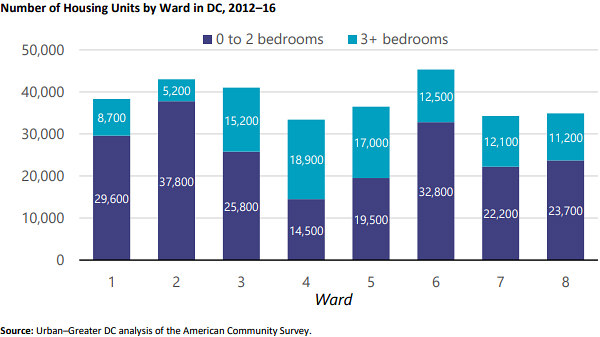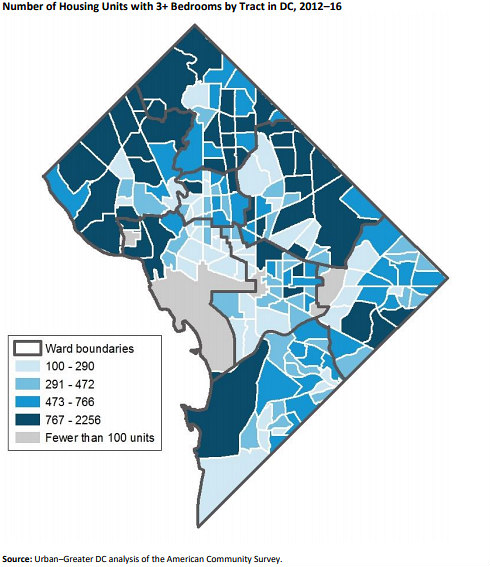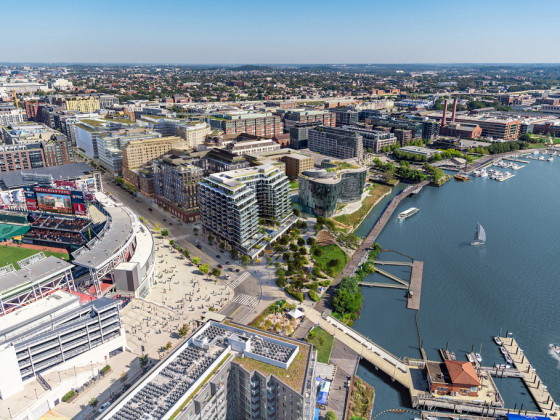What's Hot: Did January Mark The Bottom For The DC-Area Housing Market? | The Roller Coaster Development Scene In Tenleytown and AU Park
 DC Releases Findings on Need for Family-Sized Residential Units
DC Releases Findings on Need for Family-Sized Residential Units
✉️ Want to forward this article? Click here.
A new study released today shines a light on DC's need for more family-sized housing.
The Coalition for Non-Profit Housing and Economic Development and Urban Institute authored a report, commissioned by DC's Deputy Mayor for Planning and Economic Development, taking stock of the city's inventory of family-sized units and what can be done to course-correct. While many of the findings corroborate what the DC Policy Center found last year elucidating the mismatched housing market, some other interesting findings and recommendations also emerged.
- Of the approximately 307,000 housing units in DC, a third have three or more bedrooms. More specifically, 20 percent of the city's housing stock has three bedrooms, 9 percent has four bedrooms, and 4 percent has five or more bedrooms. Only 12.7 percent of the family-sized single-family homes and condos sold in 2017 were affordable to a household of four earning up to $88,000.
story continues below
loading...story continues above

- Family-sized units are distributed unevenly throughout the city and are most prevalent in Wards 3, 4 and 5. Wards 1 and 2 have the least family-sized units, with fewer than 9,000 each.
- More than 11,600 "large" households are renting and earn less than 50 percent of area median income (AMI). 75 percent of these households are cost-burdened and more than a third are under-housed, with more than one person living in each bedroom. There are roughly 6,500 households which need units renting for $750 per month (affordable to a four-person household earning up to 30 percent AMI), but only 4,000 of these units exist.

- The number of units with three or more bedrooms has increased by 14 percent since 2000, even as households with four or more people has fallen by two percent. This is because groups of unrelated adults now account for 16 percent of large renter households in the city, compared to 8 percent in 2000. Also, 79 percent of owner-occupied households and one-third of one- and two-person households are over-housed, living in units with two or more bedrooms with one or fewer residents per bedroom.
The report also explores some of the reasons why affordable family-sized units are less prevalent, along with some recommendations for how DC can create and preserve more family-sized units.
- Because larger units tend to command less revenue in rental developments due to lower per-square foot rents, development subsidies should be provided which make those per-square foot returns more equitable.
- DC could also incentivize larger units by exchanging them for additional density.
- DC is expected to have 4,000-5,700 additional large households earning up to 50 percent AMI by 2045. As the city plans to create 36,000 additional housing units in the next six years, there should be a target number of affordable family-sized units as part of this goal.
- The metrics the city uses to evaluate RFPs should be corrected, as they currently disincentivize creation and preservation of larger units. Tenant Opportunity to Purchase Act provisions are also integral to preserving larger units.
UrbanTurf will continue to keep an eye on how the city uses this new data moving forward.
See other articles related to: cnhed, coalition for nonprofit housing and economic development, dmped, family-sized units, family-sized units dc, the urban institute, three-bedroom, urban institute
This article originally published at http://dc.urbanturf.production.logicbrush.com/articles/blog/dc-releases-findings-on-the-need-for-family-sized-units/15585.
Most Popular... This Week • Last 30 Days • Ever

As mortgage rates have more than doubled from their historic lows over the last coupl... read »

The small handful of projects in the pipeline are either moving full steam ahead, get... read »

Lincoln-Westmoreland Housing is moving forward with plans to replace an aging Shaw af... read »

The longtime political strategist and pollster who has advised everyone from Presiden... read »

A report out today finds early signs that the spring could be a busy market.... read »
DC Real Estate Guides
Short guides to navigating the DC-area real estate market
We've collected all our helpful guides for buying, selling and renting in and around Washington, DC in one place. Start browsing below!
First-Timer Primers
Intro guides for first-time home buyers
Unique Spaces
Awesome and unusual real estate from across the DC Metro














